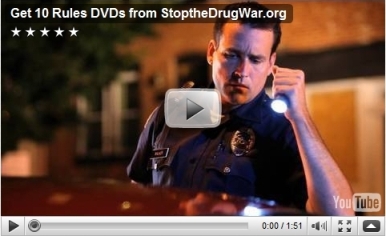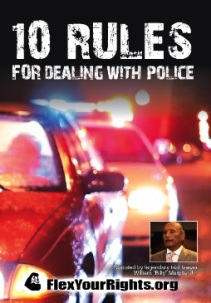Latest
Weekly: This Week in History
Law Enforcement: This Week's Corrupt Cops Stories
Europe: England to Ban Methedrone? Nutt Says Not So Fast
Feature: SSDP Does San Francisco -- The 11th Annual National Conference
Offer and Appeal: Order "10 Rules for Dealing with Police" -- Free With a Donation to StoptheDrugWar.org
Legislative Update: PTSD and Veterans
| Legislative Update:Â Increase access to medical marijuana for Veterans! Â Vote on Monday.
|
|
Chomsky on effective advocacy
Drug War Chronicle Video Review: "10 Rules for Dealing With Police," from Flex Your Rights
 |
|
 |
It's Official: South Dakota Medical Marijuana Initiative Makes November Ballot
Senate Passes Bill to Reduce, But Not Eliminate, Crack/Powder Sentencing Disparity
Press Release: Medical Marijuana Qualifies for November Ballot in South Dakota

FOR IMMEDIATE RELEASEÂ Â Â Â Â Â Â Â Â Â Â Â Â Â Â Â Â Â Â Â Â Â Â Â Â Â Â Â Â Â Â Â Â Â Â Â Â Â Â Â Â Â Â Â Â Â Â Â Â Â Â Â Â Â Â Â Â Â Â Â Â Â Â Â Â Â Â Â Â Â Â Â Â Â Â Â Â Â Â Â Â Â Â Â Â Â Â Â Â Â Â Â Â Â Â Â Â Â Â Â Â Â Â Â Â Â Â Â Â Â Â Â Â Â Â Â Â Â Â Â Â Â Â Â Â Â Â Â Â
MARCH 17, 2010
Medical Marijuana Qualifies for November Ballot in South Dakota
âMeasure 13â Would Allow Seriously Ill Patients to Use Medical Marijuana With a Doctorâs Recommendation
CONTACT: Mike Meno, MPP assistant director of communications â¦â¦ 202-905-2030 or [email protected]
Emmett Reistroffer, South Dakota Coalition for Compassion ⦠605-370-1108, [email protected]
        PIERRE, SOUTH DAKOTA â In November 2010, South Dakotans will once again have the opportunity to make the medical use of marijuana legal in the state. The South Dakota Coalition for Compassion, a nonprofit group composed of physicians, patients, law enforcement officials and private citizens, received word from the Secretary of State this week that âMeasure 13â had qualified for the ballot. The campaign submitted close to 32,000 signatures last month. They needed just 16,776 valid signatures to qualify.
        South Dakotans voted on a similar initiative in 2006, with the measure narrowly failing by a 52% to 48% margin. This yearâs âSouth Dakota Safe Access Actâ is sponsored by Patrick K. Lynch, former chairman of the board for the North Central States Chapter of the Multiple Sclerosis Society, and was drafted with the assistance of the Marijuana Policy Project.
        âWe are excited that South Dakota voters will have another opportunity to make the medical use of marijuana legal for patients in the state,â said Steve Fox, director of state campaigns for the Marijuana Policy Project. âGiven the increasing level of support for medical marijuana across the country over the past few years, we are fully confident that a solid majority of voters in the state will support patientsâ rights this November.â
        The initiative, if passed into law, would allow medical marijuana cardholders to possess up to one ounce of marijuana if they have been diagnosed with or are undergoing treatment for certain cancers, glaucoma, amyotrophic lateral sclerosis, Alzheimerâs disease, seizures or multiple sclerosis, along with other specifically diagnosable ailments. The initiative outlines specific disabilities that qualify patients for use, rules regarding registration cards, distribution, and rules for establishing a registry for medical marijuana users.
        The entire initiative can be read at http://www.sdcompassion.org/sdsaa.htm
        With more than 124,000 members and supporters nationwide, the Marijuana Policy Project is the largest marijuana policy reform organization in the United States. For more information, please visit www.mpp.org.
####
Because they can
Press Release: Medical Marijuana Bill to Be Debated by Senate Committee Thursday

MEDIA ADVISORYÂ Â Â Â Â Â Â Â Â Â Â Â Â Â Â Â Â Â Â Â Â Â Â Â Â Â Â Â Â Â Â Â Â Â Â Â Â Â Â Â Â Â Â Â Â Â Â Â Â Â Â Â Â Â Â Â Â Â Â Â Â Â Â Â Â Â Â Â Â Â Â Â Â Â Â Â Â Â Â Â Â Â Â Â Â Â Â Â Â Â Â Â Â Â Â Â Â Â Â Â Â Â Â Â Â Â Â Â Â Â Â Â Â Â Â Â Â Â Â Â Â Â Â Â Â Â Â Â Â Â Â Â Â Â Â Â Â Â Â Â Â Â Â
MARCH 17, 2010Â Â Â Â Â Â Â Â Â Â Â Â Â Â Â Â Â Â Â Â Â Â Â Â Â Â Â Â Â Â Â Â Â Â Â Â Â Â Â Â Â Â Â Â Â Â Â Â Â Â Â Â Â Â Â Â Â Â Â Â Â Â Â Â Â Â Â Â Â Â Â Â Â Â Â Â Â Â Â Â Â Â Â Â Â Â Â Â Â Â Â Â Â Â Â Â Â Â Â Â Â Â Â Â Â Â Â Â Â Â Â Â Â Â Â Â Â Â Â Â Â Â Â Â Â Â Â Â Â Â Â Â Â Â Â Â Â Â Â Â Â Â Â Â Â Â Â Â Â
Medical Marijuana Bill to Be Debated by Senate Committee on Thursday
SB 627 Would Allow Seriously Ill Patients to Use Medical Marijuana With Doctorâs Recommendation
CONTACT: Mike Meno, MPP assistant director of communications â¦â¦ 202-905-2030 or [email protected]
ANNAPOLIS, MARYLANDâ Tomorrow, on Thursday, March 18, the state Senate Judicial Proceedings Committee will receive testimony on SB 627, a bill that would make Maryland the 15th state in the nation to have an effective medical marijuana law. Sponsored by Frederick County Republican Sen. David Brinkley, the bill would allow pharmacies or other state-regulated outlets to dispense medical marijuana to patients who receive a recommendation from their doctor. The bipartisan bill is cosponsored by Senate President Mike Miller, Minority Leader Allan Kittleman, Minority Whip Nancy Jacobs, and Deputy Majority Leader Robert Garigiola, among others.
        WHAT: Hearing on SB 627, a medical marijuana bill in Maryland
        WHERE: 2 East, Miller Senate Building, 11 Bladen Street, Annapolis, MD
WHEN: Thursday, March 18, at 1 p.m. (Please note that 11 bills are scheduled for the 1:00 p.m. hearing and we donât know what order they will be called in.)
        WHO: Patients, advocates and others will testify
        The House Judiciary and Health and Government Operations committees heard testimony Feb. 26 on HB 712, companion legislation sponsored by Del. Dan Morhaim (D-Baltimore County), an E.R. physician, and cosponsored by 47 other delegates. Several doctors, patients and advocates spoke in support of the bill during the previous hearing, and a similar turnout is expected Thursday.
        With more than 124,000 members and supporters nationwide, the Marijuana Policy Project is the largest marijuana policy reform organization in the United States. For more information, please visit www.mpp.org.
####
Press Release: Kansas Medical Marijuana Bill to be Subject of Informational Hearing Today

MEDIA ADVISORYÂ Â Â Â Â Â Â Â Â Â Â Â Â Â Â Â Â Â Â Â Â Â Â Â Â Â Â Â Â Â Â Â Â Â Â Â Â Â Â Â Â Â Â Â Â Â Â Â Â Â Â Â Â Â Â Â Â Â Â Â Â Â Â Â Â Â Â Â Â Â Â Â Â Â Â Â Â Â Â Â Â Â Â Â Â Â Â Â Â Â Â Â Â Â Â Â Â Â Â Â Â Â Â Â Â Â Â Â Â Â Â Â Â Â Â Â Â Â Â Â Â Â Â Â Â Â Â Â Â Â Â Â Â Â Â Â Â Â Â Â Â Â Â
MARCH 17, 2010Â Â Â Â Â Â Â Â Â Â Â Â Â Â Â Â Â Â Â Â Â Â Â Â Â Â Â Â Â Â Â Â Â Â Â Â Â Â Â Â Â Â Â Â Â Â Â Â Â Â Â Â Â Â Â Â Â Â Â Â Â Â Â Â Â Â Â Â Â Â Â Â Â Â Â Â Â Â Â Â Â Â Â Â Â Â Â Â Â Â Â Â Â Â Â Â Â Â Â Â Â Â Â Â Â Â Â Â Â Â Â Â Â Â Â Â Â Â Â Â Â Â Â Â Â Â Â Â Â Â Â Â Â Â Â Â Â Â Â Â Â Â Â Â Â Â Â Â Â
Kansas Medical Marijuana Bill to be Subject of Informational Hearing Today
Rep. Gail Finney Has Proposed a Bill that Would Allow Doctors to Recommend Medical Marijuana for Seriously Ill Patients
CONTACT: Mike Meno, MPP assistant director of communications â¦â¦ 202-905-2030 or [email protected]
TOPEKA, KANSASâ Today, the Kansas House Health and Human Services Committee will hold an informational hearing on a medical marijuana bill proposed by Rep. Gail Finney. Under the proposal, doctors could recommend medical marijuana to patients with serious illnesses such as cancer or HIV/AIDS. Fourteen other states, including Colorado and New Mexico, have passed similar laws.
        WHAT: Informational presentation on medical marijuana
        WHERE: Docking State Office Building, Room 784, 915 SW, Harrison Street, Topeka
WHEN: Wednesday, March 17, at 1 p.m.
        WHO: Patients, medical professionals, and others will speak. Â
        With more than 124,000 members and supporters nationwide, the Marijuana Policy Project is the largest marijuana policy reform organization in the United States. For more information, please visit www.mpp.org.
####
Pagination
- First page
- Previous page
- …
- 471
- 472
- 473
- 474
- 475
- …
- Next page
- Last page